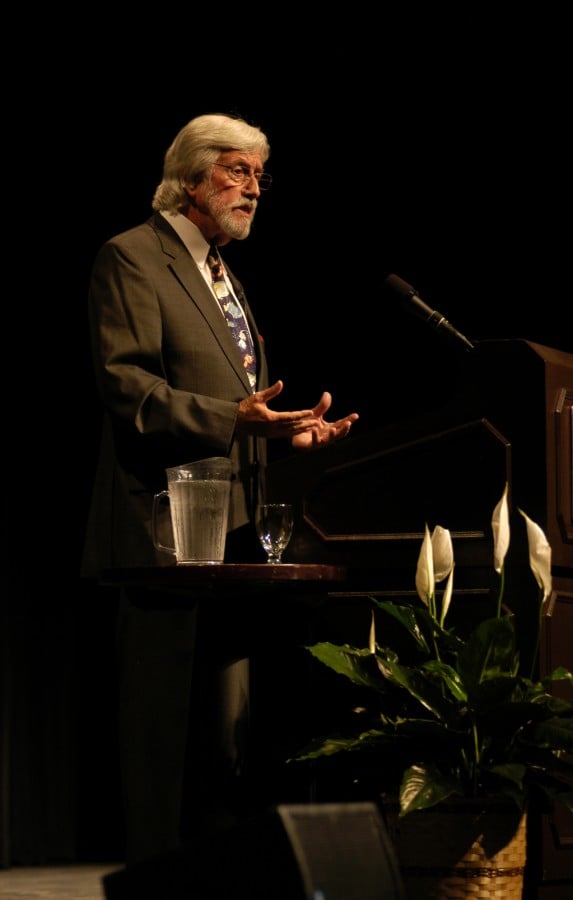“Tonight’s guest, Jean-Michel Cousteau, is a leading environmentalist and oceanographer who has spent a lifetime communicating his love and concern for our planet’s water,” said President and Professor of Political Science Kent Chabotar as he introduced the final 2010-11 Bryan Series speaker.
Cousteau presented on April 12, focusing on problems facing the earth’s oceans and waterways. Cousteau outlined three major issues facing our world’s oceans: the destruction of habitats, overfishing and pollution. Cousteau addressed the destruction of habitats first.
“We try to protect more and more of (the ocean habitats), but we’re farther away from what we need to do,” Cousteau said. “… Ice is melting, and the ocean is rising. It isn’t rising very fast, but it is rising. That puts extra energy in the ecosystem, and storms get worse.”
Cousteau then moved on to the issue of overfishing.
“We have already removed 90 percent of the ocean’s big fish,” Cousteau said. “It really is anarchy out there.”
Cousteau spoke of specific overfishing-related problems, such as fishers that capture sharks for only their fins and tails, wasting the rest of the carcass.
Another problem Cousteau addressed was oceanic pollution.
“Everyone is using the ocean as a universal sewer,” said Cousteau. “It’s gotten to the point where nature is saying enough is enough.”
Cousteau pointed out that birds will often eat small, discarded plastic items in search of fish eggs, and then feed those same plastic items to their offspring.
“Nature can take a lot of punishment,” said Cousteau. “These creatures are doing remarkably well, considering what they have to put up with. But then again, perhaps too much is too much.”
But for every problem Cousteau outlined, he brought up examples of people who are helping and what everyone can do to improve the situation.
Cousteau spoke of the need to get kids outside and immersed in nature to better understand and appreciate their environment.
“I really liked the idea of getting children outside,” said Professor of English Jim Hood. “That’s key to solving environmental issues — getting kids outside so they can appreciate and enjoy the natural environment.”
“(The presentation) wasn’t just frightening images; it was images of things getting better,” said senior Naomi Lewis. “A lot of environmental images show how everybody is bad, or that they don’t care about the environment, and he’s taking the opposite view by acknowledging that there are people helping.”
Lewis walked away from the talk impressed and inspired.
“When I was younger, my dad was really into Jacques Cousteau, but being born in ‘89 and Cousteau dying in ‘97, I didn’t really know why,” said Lewis. “Going to the Bryan Series, I thought, ‘Aha — this is why you’re great, and this is why my dad talked about you all the time.'”
When Cousteau’s presentation finished, Chabotar returned to the stage to announce the 2011-12 Bryan Series line-up.
“Your input to the speaker selections was important, and we have chosen some of your favorites,” said Chabotar. “Guilford College takes great pride in presenting an outstanding set of programs each year, and this may be the best yet.”
The next Bryan Series will open with former British Prime Minister Tony Blair. Following Blair will be choreographer Twyla Tharp, CNN Senior Medical Correspondent Sanjay Gupta, documentary filmmaker Ken Burns, and journalist Fareed Zakaria.
Hood commented on next year’s headliner.
“It will be very interesting to see what Blair has to say, particularly given the fact that he’s aligned himself with socially responsible Christianity in a country where church attendance is even lower than it is here in the United States,” said Hood.
For more information on the 2011-12 Bryan Series, please visit http://bryanseries.guilford.edu.

